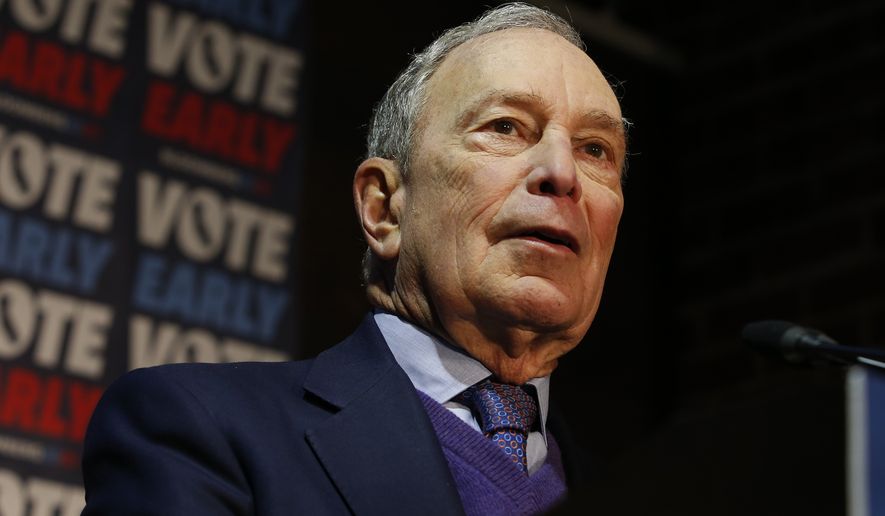The Democratic presidential hopefuls’ performances in Iowa Monday night, win or lose, will be overshadowed by a looming presence that goes by the name of Michael Bloomberg.
The billionaire media mogul and former New York City mayor sat out the caucuses and the next few early nominating contests. But he is climbing in the polls and poised to pounce on the field of Democratic candidates in the Super Tuesday primaries next month.
His wait-it-out strategy could make him the real, though absentee, winner in Iowa, said Richard Lewis Pacelle Jr., a political science professor at the University of Tennessee, Knoxville.
“Bloomberg is a smart enough guy not to just be running a lost campaign. He knows there is no real frontrunner. He knows people seem to be a little bit dissatisfied,” he said.
Sitting out the early contests also underscores Mr. Bloomberg’s outsider image.
“There is a lot of feeling that maybe we need someone from the outside,” Mr. Pacelle said.
Mr. Bloomberg is managing to stay in the headlines while his rivals lay claim to Iowa and then New Hampshire, whose primary is scheduled for Feb. 11.
He will campaign Tuesday in Philadelphia, where he secured the endorsement of Mayor Michael Nutter, who said the former New York City mayor could tackle the issues of gun violence, the environment and health care access.
Mr. Bloomberg shelled out $10 million for an ad Sunday during the Super Bowl, which nearly 100 million people watched. The ad focused on Mr. Bloomberg’s gun-control agenda.
The ad competed with Mr. Trump, who also spent about $10 million for a spot during the big game.
Mr. Bloomberg has recently caught the president’s attention by reportedly spending about $200 million on ads criticizing Mr. Trump and his administration.
The president took to Twitter saying Mr. Bloomberg is spreading fake news and labeling him “mini Mike.”
“Bloomberg is the one candidate who really gets under Trump’s skin,” Mr. Pacelle said. “As more Democrats kind of watch this, they might like him a little bit more because Trump seems to be a little bit obsessed with him.”
The crowded field of Democratic candidates increases the likelihood of no clear frontrunner emerging from the early contests, which would set up Mr. Bloomberg as a compromise candidate and a potential unifying figure.
Mr. Bloomberg, although he jumped in the race much later than others, is in fourth place nationally with about 8%, according to the Real Clear Politics average of polls.
He is behind Sen. Elizabeth Warren, Massachusetts Democrat, who is in third place. Sen. Bernard Sanders, Vermont independent, is in second place, and former Vice President Joseph R. Biden is in first place nationally by just a few points.
The Democratic National Committee recently announced it will change its primary debate criteria, eliminating the donor requirement, which will allow Mr. Bloomberg to get on the debate stage. Since he is self-funding his campaign, he hasn’t been able to meet the donor requirement.
That could allow Mr. Bloomberg to appeal to Democratic primary voters during the Feb. 19 nationally televised debate in Las Vegas.
Richard Anderson, a political science professor at the University of California, Los Angeles, said the DNC appears to be biased against the more progressive candidates such as Mr. Sanders and Ms. Warren.
He noted that if Mr. Bloomberg were to win the Democratic nomination, his candidacy could help lower ballot candidates.
“Since he’s self-financed, the DNC frees up money that it can spend on Senate campaigns,” Mr. Anderson said.
• Alex Swoyer can be reached at aswoyer@washingtontimes.com.




Please read our comment policy before commenting.